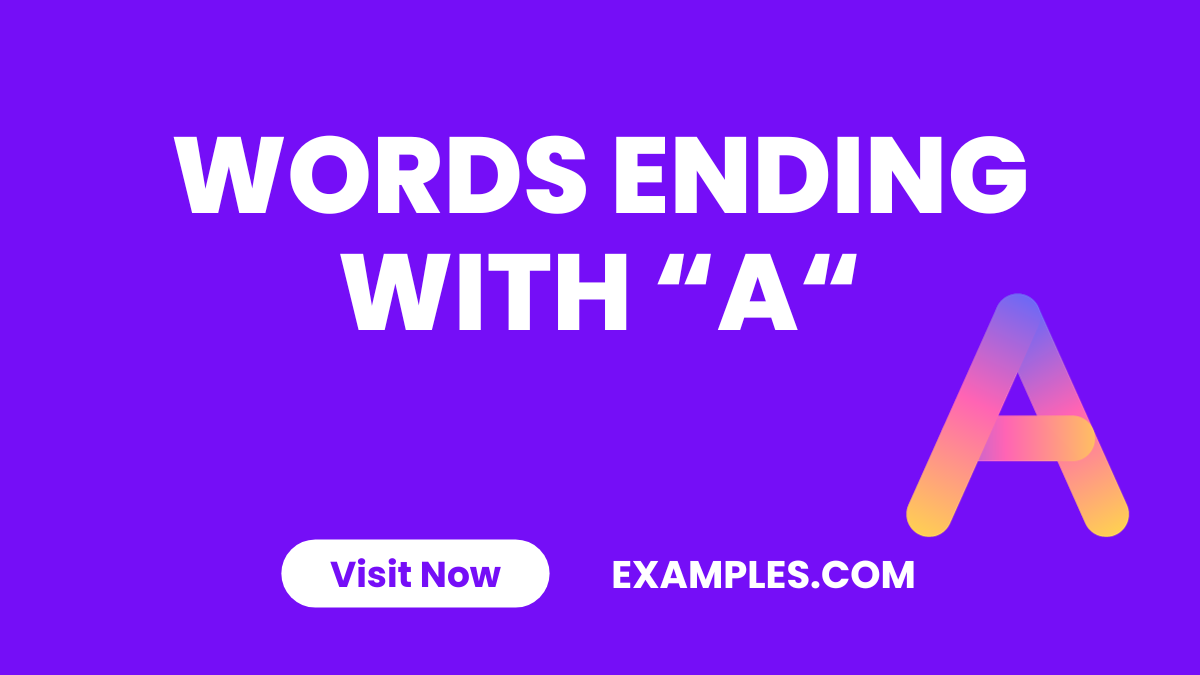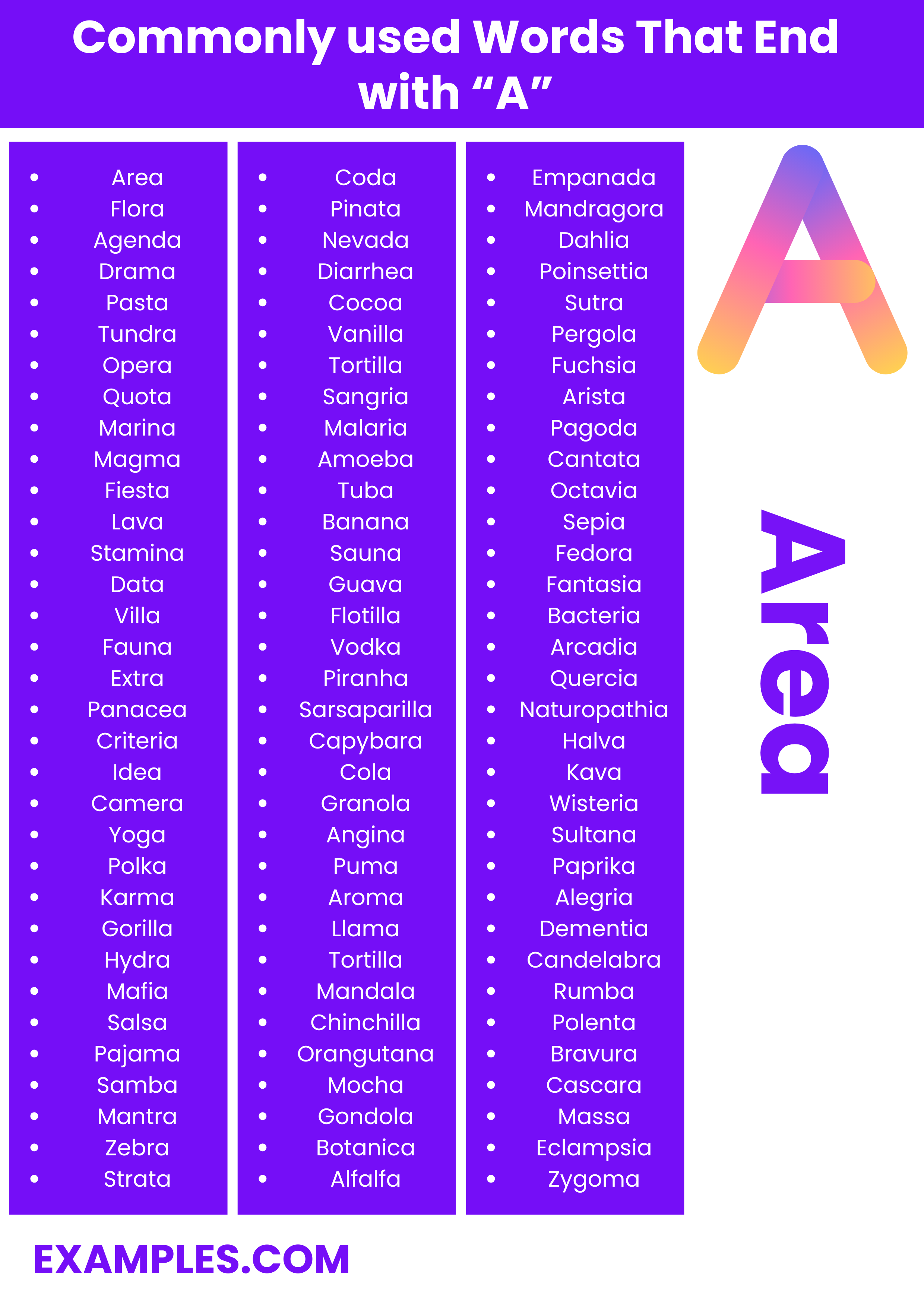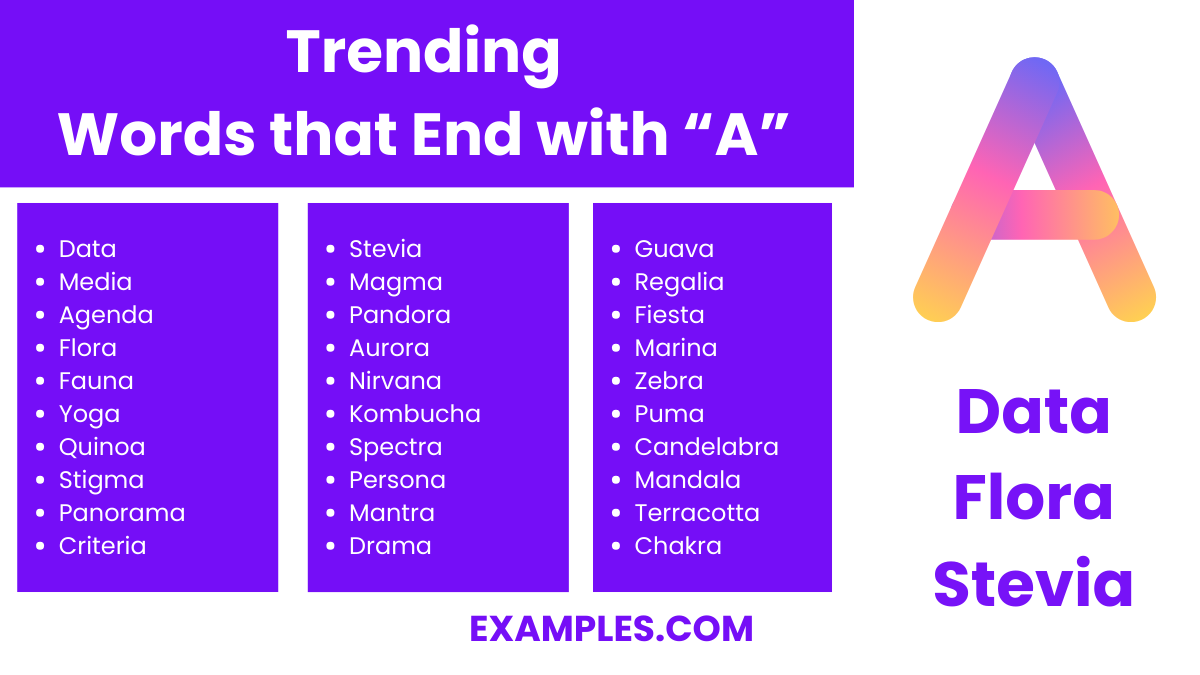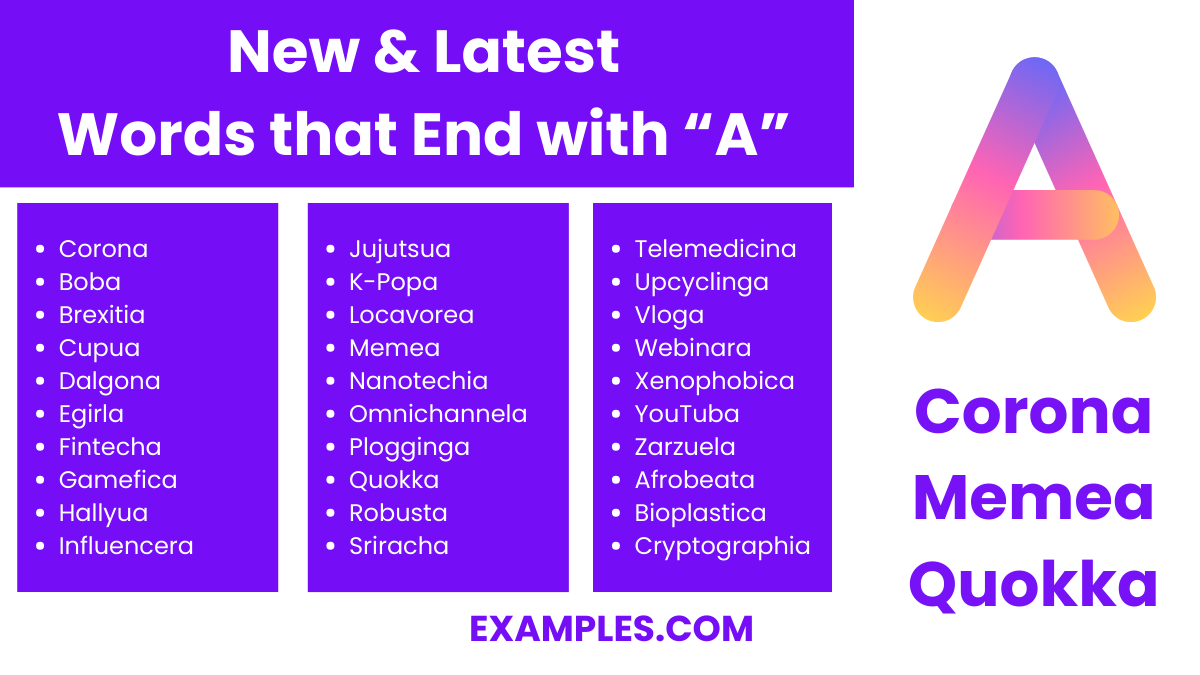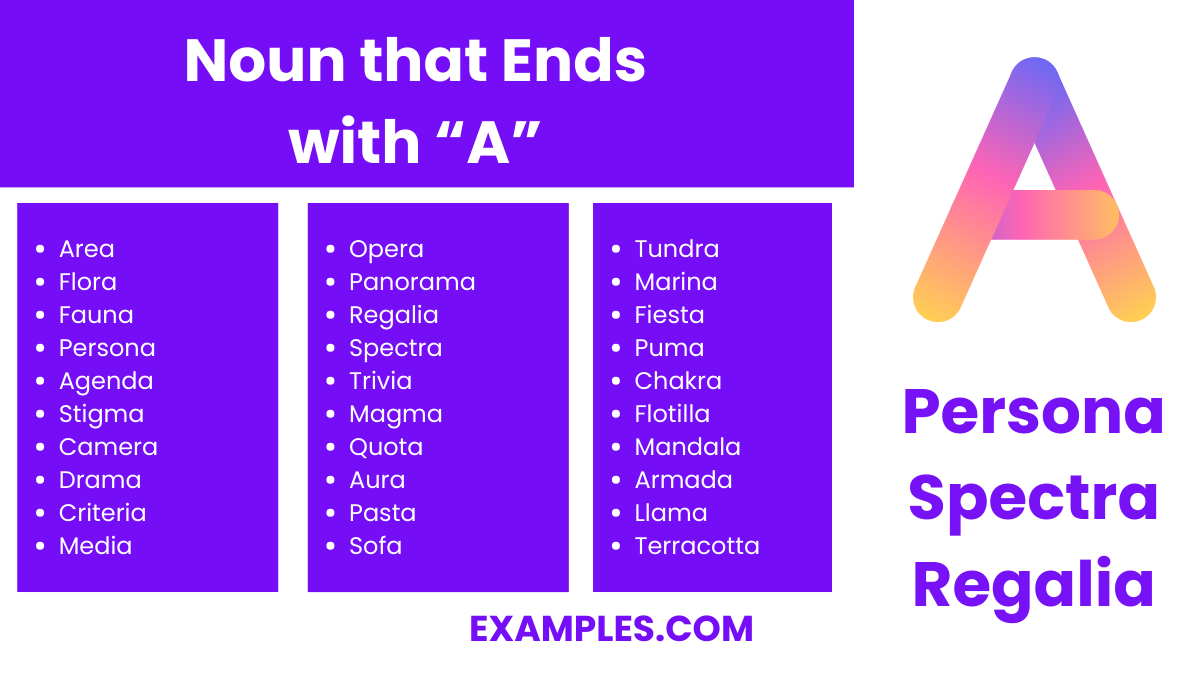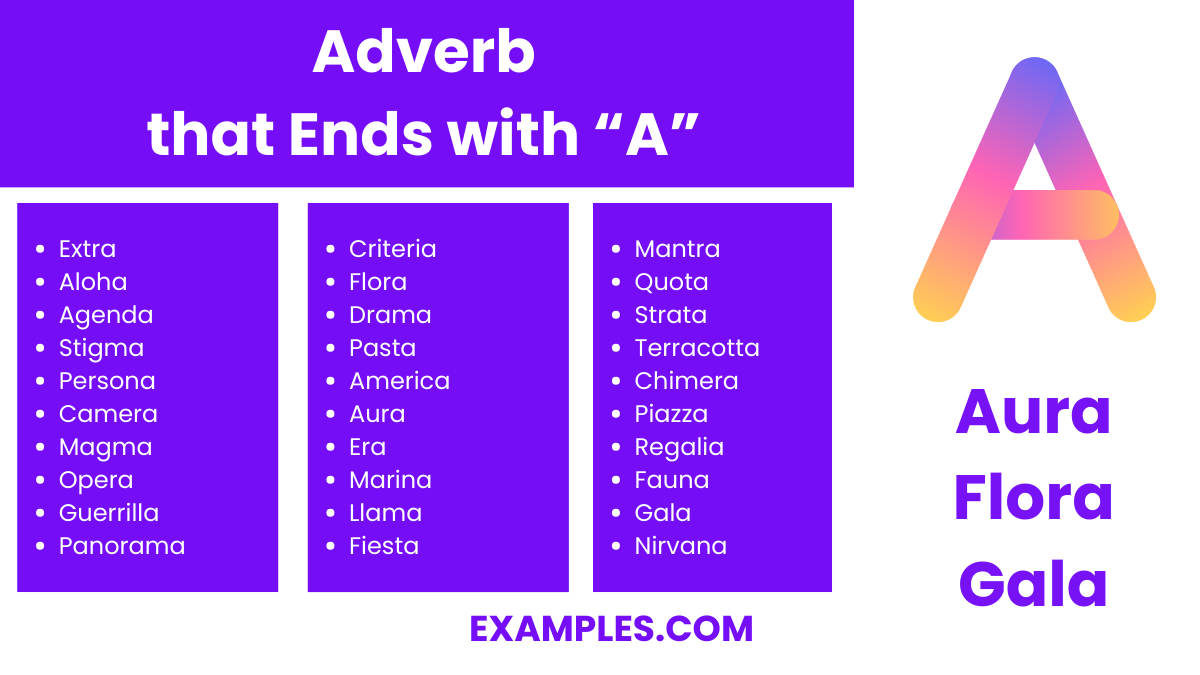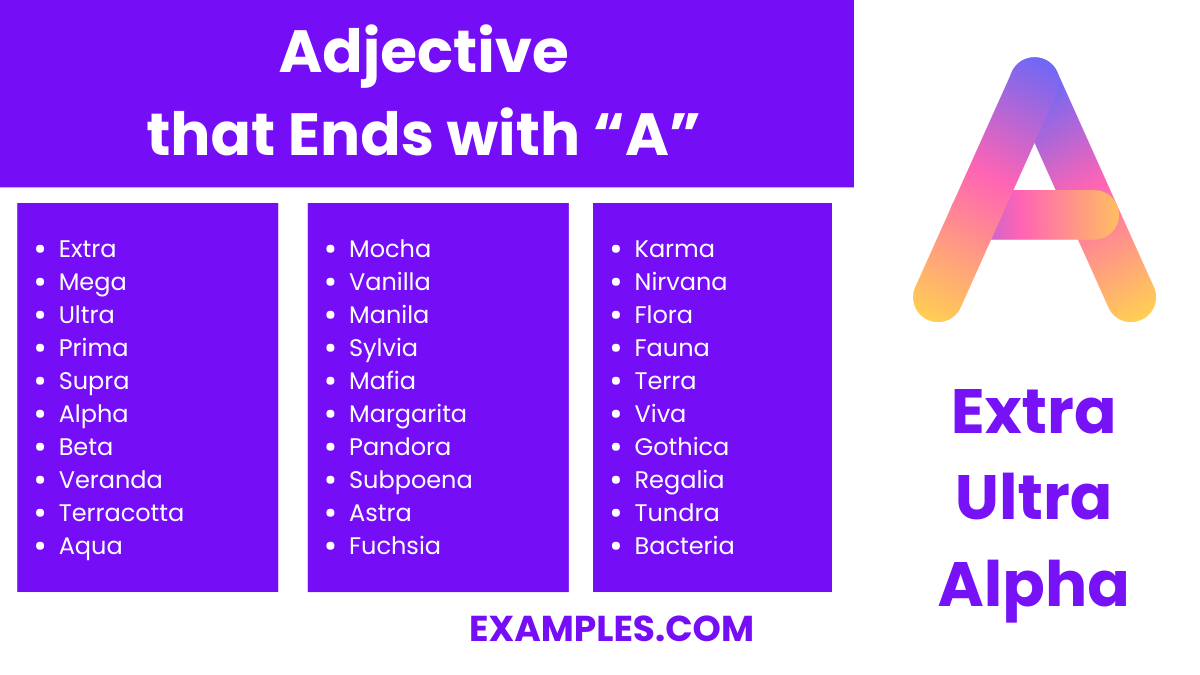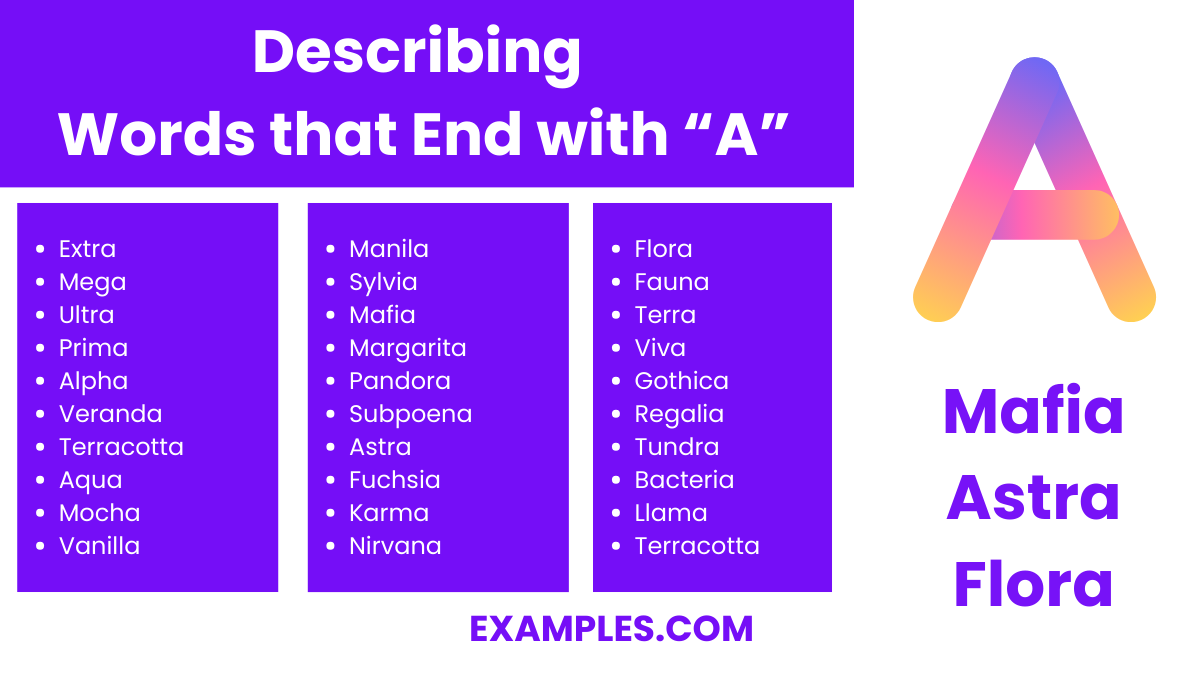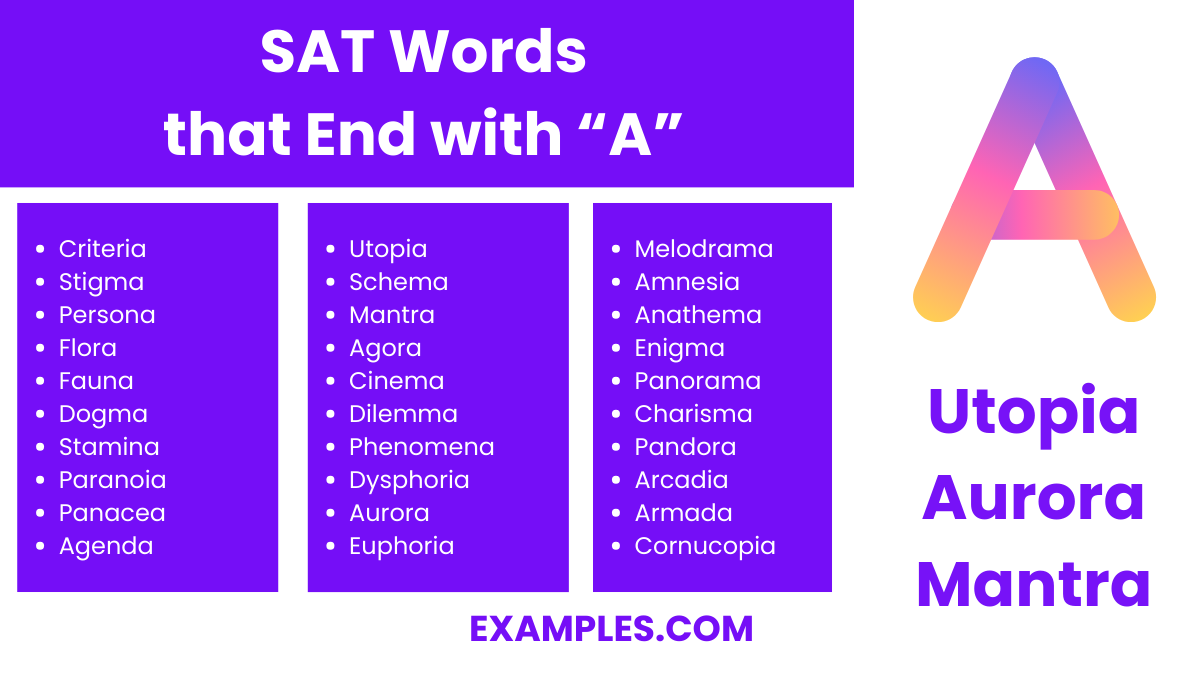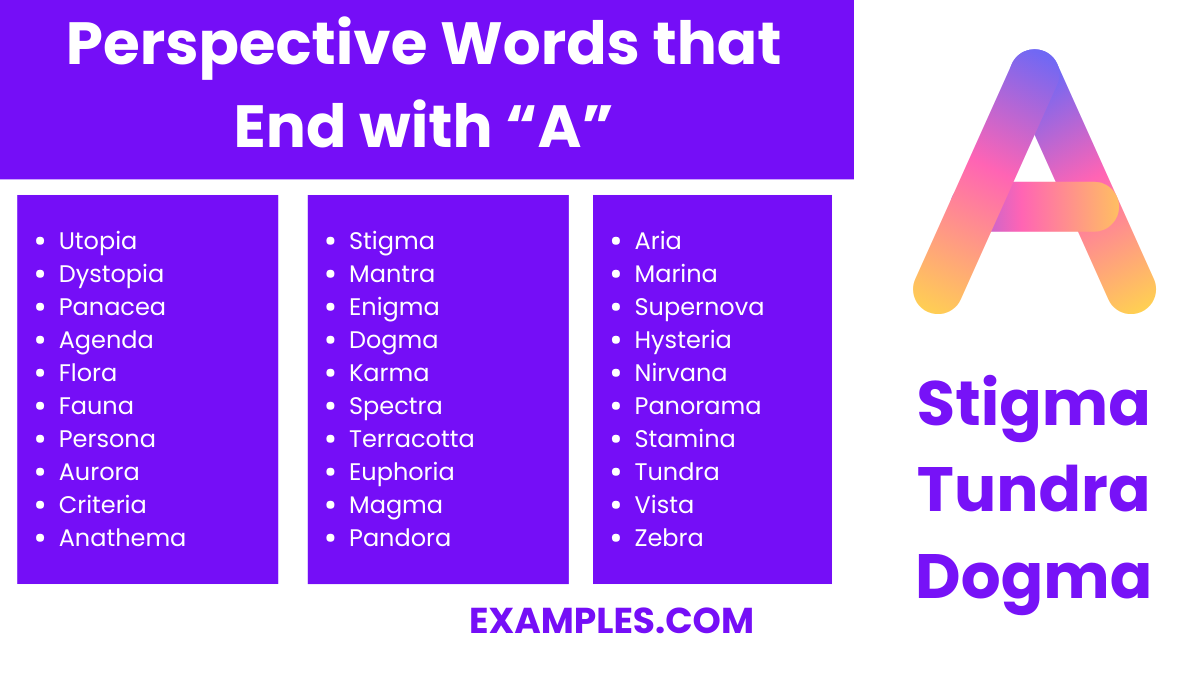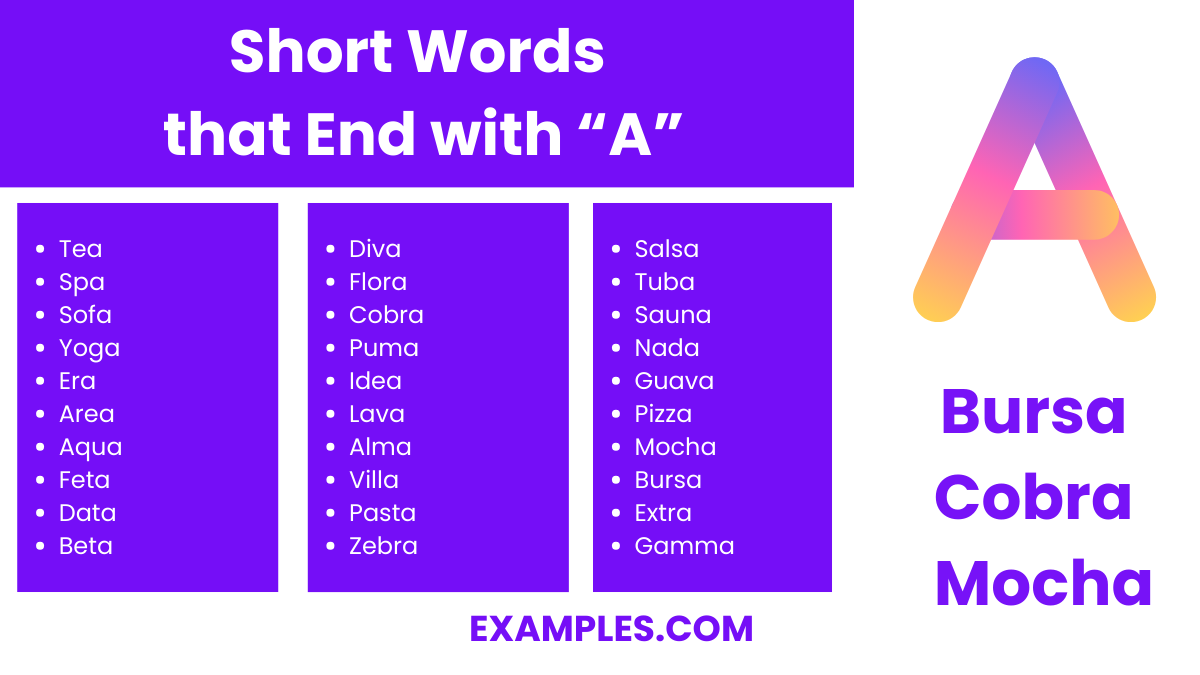Words Ending with A
The English language is adorned with an array of “A Words” that add vibrancy and depth to our communication. From “Aura,” which conjures an atmosphere of mystery, to “Allegria,” signifying joy and merriment, these words paint a colorful linguistic landscape. “Aroma” evokes the senses, while “Agora” transports us to ancient marketplaces bustling with life. “Amnesia” delves into the realms of memory, contrasting with “Aria’s” melodious flights. Each “A Word” offers a unique hue to the canvas of expression, enabling writers and speakers to craft messages with precision and poetry. Embracing these words is not merely about vocabulary expansion but about embracing the richness that English has to offer, illuminating conversations and texts with the diverse shades of “A.”
Download Most Commonly Used Words that End with A - PDF
250 Most Commonly Used Words Ending with “A”
Words ending with ‘A’ offer a delightful diversity in the English language, touching on various subjects and embodying different meanings. They are deeply rooted in various cultures and languages, reflecting the rich, inclusive nature of English. For educators, these words provide an opportunity to expand vocabulary and engage students with the beauty and complexity of language. This carefully revised list includes Daily Use English Words and emphasizes the distinction between singular & plural words, perfect for educational enrichment. Each word, chosen for its commonality and relevance, promises to enhance linguistic understanding and appreciation, making it an invaluable tool for both teaching and learning.
| Area | Flora | Agenda | Drama | Pasta | Tundra |
| Opera | Quota | Marina | Magma | Fiesta | Lava |
| Stamina | Data | Villa | Fauna | Extra | Panacea |
| Criteria | Idea | Camera | Yoga | Polka | Karma |
| Gorilla | Hydra | Mafia | Salsa | Pajama | Samba |
| Mantra | Zebra | Strata | Coda | Pinata | Nevada |
| Diarrhea | Cocoa | Vanilla | Tortilla | Sangria | Malaria |
| Amoeba | Tuba | Banana | Sauna | Guava | Flotilla |
| Vodka | Piranha | Sarsaparilla | Capybara | Panacea | Cola |
| Granola | Angina | Puma | Aroma | Llama | Tortilla |
| Mandala | Chinchilla | Orangutana | Mocha | Gondola | Botanica |
| Alfalfa | Empanada | Mandragora | Dahlia | Poinsettia | Sutra |
| Pergola | Fuchsia | Arista | Pagoda | Cantata | Octavia |
| Sepia | Fedora | Fantasia | Bacteria | Arcadia | Quercia |
| Naturopathia | Halva | Kava | Wisteria | Sultana | Paprika |
| Alegria | Dementia | Candelabra | Rumba | Polenta | Bravura |
| Cascara | Massa | Eclampsia | Zygoma | Lantana | Pina Colada |
| Jacaranda | Upupa | Bruschetta | Candelilla | Begonia | Abelia |
| Samosa | Azalea | Mimosa | Spirulina | Gazania | Sabra |
| Magnolia | Cassava | Galleria | Fajita | Canna | Tortilla |
| Anemia | Europa | Panacea | Area | Botanica | Dahlia |
| Bacopa | Gondola | Jaborosa | Scapula | Strelitzia | Poinsettia |
| Sutra | Pergola | Fuchsia | Forna | Pagoda | Cantata |
| Octavia | Sepia | Fedora | Fantasia | Vacua | Arcadia |
| Verbena | Naturopathia | Halva | Kava | Wisteria | Sultana |
| Paprika | Alegria | Dementia | Candelabra | Rumba | Fajita |
| Bravura | Cascara | Massa | Eclampsia | Ithaca | Lantana |
| Pina Colada | Jacaranda | Taka | Bruschetta | Candelilla | Begonia |
| Kielbasa | Samosa | Azalea | Mimosa | Spirulina | Gazania |
| Sabra | Magnolia | Cassava | Galleria | Fajita | Gardenia |
| Tortilla | Anemia | Europa | Panacea | Semolina | Gerbera |
| Aroma | Sequoia | Viola | Henna | Aloha | Tarantula |
| Zamia | Barista | Kamala | Xanthoria | Carcinoma | Coma |
| Petunia | Lyrica | Nirvana | Placenta | Quinoa | Rhododendra |
| Silica | Trivia | Utopia | Vagina | Java | Xenophobia |
| Yucca | Zinfandela | Accra | Ballerina | Candelabra | Decima |
| Euphoria | Favela | Genista | Delta | Insomnia | Jicama |
| Koala | Lunula | Mimosa | Nostalgia | Ocarina | Paella |
| Quota | Rotunda | Spina | Tiara | Umbrella | Vanilla |
| Duodena | Xerophyta | Yokozuna | Zenana | Abba | Belladonna |
| Cicada | Diarrhea | Encina | Frangipania | Decima | Hacienda |
| Inertia | Jacana | Kabbala | Lantana | Medusa | Ischia |
| Ostraca | Placita | Quanta | Riviera | Shelta | Tagliatella |
| Ulna | Vagina | Walla | Upupa | Yautia | Zebra |
Trending Words that End with “A”
Your ongoing quest to enrich your students’ vocabulary with engaging and innovative content, keeping abreast of the most trending words is crucial. These words not only invigorate classroom discussions but also lend contemporary relevance and vitality to written assignments. Below, you’ll find a curated list of 30 trending words ending with “a,” carefully selected for their pertinence in modern discourse. This assortment includes festive Christmas Words to bring seasonal joy into your lessons and Compound Words that demonstrate the dynamic nature of language evolution, making it a valuable resource for your educational toolkit.
- Data – A staple in discussions around technology and research.
- Media – Central to understanding information and communication studies.
- Agenda – Useful in planning and organizational contexts.
- Flora – Brings nature into the classroom, discussing plants and biology.
- Fauna – Complements flora, focusing on animal life.
- Yoga – Reflects the growing interest in wellness and mindfulness.
- Quinoa – Introduces discussions about nutrition and global cuisine.
- Stigma – Useful in social science discussions about societal perceptions.
- Panorama – Enhances geographical and visual learning.
- Criteria – A critical term in assessment and evaluation.
- Stevia – Connects to lessons on natural sweeteners and health.
- Magma – Sparks interest in geology and earth sciences.
- Pandora – Bridges literature, mythology, and cultural studies.
- Aurora – Illuminates discussions around astronomy and natural wonders.
- Nirvana – Opens up cultural and spiritual discussions.
New & Latest Added Words that End with “A”
The perpetual learning and teaching, introducing fresh and recently popularized words that end with “a” is an exciting venture. These new additions to the English lexicon mirror the evolving cultural, technological, and social landscapes, offering a window into contemporary dialogue. They make your teaching content more relatable and forward-thinking. This compilation, enriched with Consonant Words to highlight phonetic diversity and Dictation Words to enhance spelling proficiency, presents 30 of the latest words ending in “a.” It’s designed to invigorate your vocabulary and lesson plans, fostering a dynamic and engaging learning environment.
- Corona – Has become pivotal in discussions about health and society.
- Boba – Reflects global culinary interests and cultural exchange.
- Brexitia – Engages with current events and political discourse.
- Cupua – Introduces biodiversity and discussions about the Amazon.
- Dalgona – Popularized through social media, tying into discussions about trends.
- Egirla – Reflects contemporary subcultures and digital identities.
- Fintecha – Merges economics, technology, and innovation in learning.
- Gamefica – Discusses the growing influence of gamification in various sectors.
- Hallyua – Opens up cultural studies with a focus on Korean wave.
- Influencera – Central to understanding media, marketing, and social networks.
- Jujutsua – Introduces physical education, discipline, and cultural sport.
- K-Popa – Brings global music and cultural phenomena into the classroom.
- Locavorea – Ties into discussions about sustainability and food sources.
- Memea – Engages with digital culture and communication.
- Nanotechia – Invokes discussions around cutting-edge science and engineering.
Noun That End with “A”
In your enduring quest to expand the intellectual vistas of your students, integrating a varied array of nouns ending with “a” can significantly deepen their linguistic acumen. These nouns, imbued with cultural, scientific, and literary value, serve not only to refine both written and oral competencies but also to widen lexical scope. The compilation below, infused with Encouraging Words to uplift spirits and Funny Words to inject humor, encompasses 30 carefully selected nouns ending with “a.” This assortment is meticulously tailored to enrich your lesson plans and stimulate engaging classroom dialogues, thereby fostering a more comprehensive and enjoyable learning experience.
- Area – A measure of space or a specific region.
- Flora – Plants of a particular region, habitat, or period.
- Fauna – The animals of a particular region, habitat, or period.
- Persona – The aspect of someone’s character perceived by others.
- Agenda – A list of items to be discussed at a formal meeting.
- Stigma – A mark of disgrace associated with a particular circumstance.
- Camera – A device for capturing visual images in the form of photographs.
- Drama – A play for theater, radio, or television.
- Criteria – A principle or standard by which something may be judged.
- Media – The main means of mass communication.
- Opera – A dramatic work combining text and musical score.
- Panorama – An unbroken view of an entire surrounding area.
- Regalia – The emblems or insignia of royalty.
- Spectra – Plural of spectrum, used in scientific contexts.
- Trivia – Details or pieces of information of little importance.
Adverb That End with “A”
Adverbs ending with “A” are intriguing elements in the English language, albeit rare, that can significantly enhance its descriptive quality. These adverbs, when used aptly, have the power to modify a verb, an adjective, or another adverb, thereby enriching expression in both speech and writing. For educators aiming to deepen their students’ grasp of adverbial forms, these examples can be enlightening. Although adverbs ending with ‘A’ are not common, the selected examples here, including Ness Words that convey states or qualities and Pictionary Words that challenge visualization, are intended to broaden the understanding and appreciation of the subtleties within English grammar, making them a valuable addition to linguistic education.
- Extra – Beyond or more than what is usual, expected, or necessary.
- Aloha – With friendly intent (borrowed from Hawaiian, often used figuratively).
- Agenda – With a particular focus or goal in mind.
- Stigma – With a mark of disgrace or infamy.
- Persona – In the aspect of someone’s character that is presented to or perceived by others.
- Camera – Related to camera work or photography.
- Magma – In a manner related to or involving magma.
- Opera – Pertaining to opera or operatic performance.
- Guerrilla – In an irregular or unconventional manner, often related to warfare.
- Panorama – With a wide view surrounding the observer.
- Criteria – Based on a set of standards or conditions.
- Flora – Related to plant life of a particular region.
- Drama – In a dramatic or theatrical manner.
- Pasta – Related to or involving pasta.
- America – Pertaining to America or in an American manner.
Adjective That End with “A”
Enhancing your students’ descriptive language is pivotal in deepening their understanding and expression. Adjectives ending with “a” offer a rich palette for vivid descriptions and nuanced comprehension, capable of illuminating texts, invigorating discussions, and honing analytical skills. Below is a curated list of 30 adjectives ending with “a,” meticulously selected for their relevance and linguistic vibrancy. These adjectives, including Praising Words to foster positivity and Vowel Words to emphasize phonetic variety, can significantly enrich students’ vocabulary. Encourage your students to delve into the breadth and depth of descriptive language with these adjectives, expanding their expressive capabilities and fostering a more engaging learning environment.
- Extra – More than is due, usual, or necessary.
- Mega – Extremely large.
- Ultra – Going beyond usual limits.
- Prima – First or leading.
- Supra – Above, over, or beyond.
- Alpha – Denoting the most prominent or primary.
- Beta – Indicating the second most prominent.
- Veranda – Relating to an open-air gallery.
- Terracotta – Of a brownish-red color.
- Aqua – Of or relating to water.
- Mocha – Relating to the Arabian coffee or its color.
- Vanilla – Flavored with vanilla; lacking in variety.
- Manila – Relating to the capital of the Philippines.
- Sylvia – Relating to the forest.
- Mafia – Relating to organized crime.
Phrasal Verbs That End with “A”
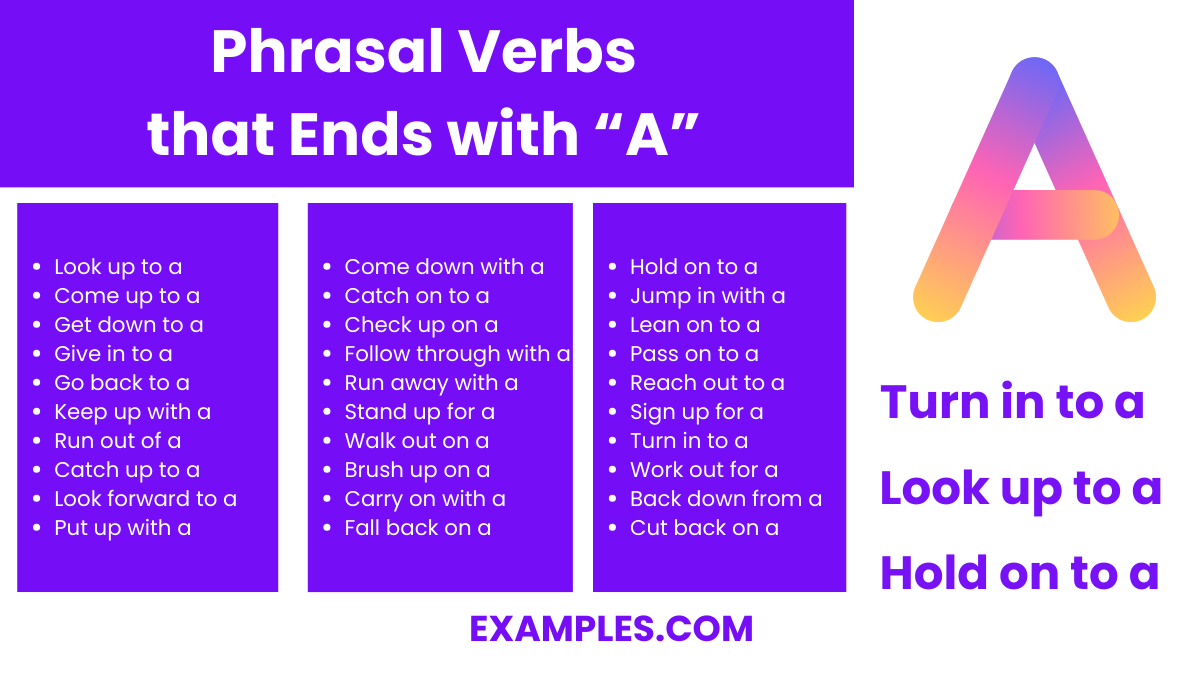
Finding phrasal verbs that end with ‘A’ is indeed an unusual request, as phrasal verbs in English don’t typically conclude with ‘A’. However, idiomatic expressions or phrases that function in a manner akin to phrasal verbs can be explored. These expressions, rich with cultural and linguistic nuances, play a vital role in conversational English. Teachers can leverage these idiomatic phrases to delve deeper into the intricacies of idiomatic language with their students, thereby enhancing their understanding of the fluid and adaptable nature of English. While these expressions don’t conform to the traditional structure of phrasal verbs ending in ‘A’, they provide valuable insights into language’s versatility and serve as practical tools for mastering conversational English, including the recognition and use of Sight Words, which are fundamental to language fluency.
- Look up to a – To respect or admire someone.
- Come up to a – To approach or reach a certain point.
- Get down to a – To start to direct your efforts and attention towards something.
- Give in to a – To agree to do something that you don’t want to do.
- Go back to a – To return to a place or person.
- Keep up with a – To continue to be informed about something.
- Run out of a – To have no more of something.
- Catch up to a – To reach someone who is ahead by going faster.
- Look forward to a – To feel pleased and excited about something that is going to happen.
- Put up with a – To tolerate or accept an unpleasant situation or person without complaining.
- Come down with a – To start to suffer from an illness, especially one that is not serious.
- Catch on to a – To begin to understand or realize something.
- Check up on a – To make sure that someone is doing what they should be doing.
- Follow through with a – To continue an action or task to its conclusion.
- Run away with a – To leave a place or person suddenly.
Describing Words That End with “A”
Dear educators, the power of descriptive language in shaping young minds cannot be understated. Describing words that end with “a” offer a unique way to enrich student vocabulary and enhance their descriptive capabilities. These words add color, emotion, and precision to communication, making narratives more vivid and arguments more compelling. Below is a curated list of 30 describing words ending with “a,” selected for their linguistic richness and relevance to contemporary discourse.
- Extra – More than usual or necessary; additional.
- Mega – Extremely large, heavy, or intense.
- Ultra – Going beyond usual limits; extreme.
- Prima – First or leading, often used in music.
- Alpha – Denoting the first or primary, often used in science.
- Veranda – Relating to a long porch from a building.
- Terracotta – A type of earthenware, in a brownish-orange color.
- Aqua – Related to water; typically light blue or green.
- Mocha – Related to coffee, especially in color.
- Vanilla – Plain or conventional, sometimes used to denote flavor.
- Manila – Related to the capital of the Philippines, often used for folders or envelopes.
- Sylvia – Related to the forest, often poetic.
- Mafia – Pertaining to organized crime syndicates.
- Margarita – Related to a type of cocktail.
- Pandora – Symbolizing a source of unexpected troubles.
SAT Words That End with “A”
Esteemed educators, preparing students for the SAT requires exposure to a wide range of vocabulary. Words that end with “a” are no exception and can often be found in SAT reading and writing sections. Here is a curated list of 30 words ending with “a” that are frequent flyers in SAT contexts. These words are selected for their complexity and utility in various discourses, making them perfect for enhancing SAT preparation. Incorporate these words into your SAT prep classes to ensure your students are well-prepared and confident in their abilities to tackle the exam.
- Criteria – Standards by which something is judged or decided.
- Stigma – A mark of disgrace associated with a particular circumstance, quality, or person.
- Persona – The aspect of someone’s character that is presented to or perceived by others.
- Flora – The plants of a particular region, habitat, or geological period.
- Fauna – The animals of a particular region, habitat, or geological period.
- Dogma – A principle or set of principles laid down by an authority as incontrovertibly true.
- Stamina – The ability to sustain prolonged physical or mental effort.
- Paranoia – Suspicion and mistrust of people or their actions without evidence or justification.
- Panacea – A solution or remedy for all difficulties or diseases.
- Agenda – A list of items to be discussed at a formal meeting.
- Utopia – An imagined place or state of things in which everything is perfect.
- Schema – A representation of a plan or theory in the form of an outline or model.
- Mantra – A statement or slogan repeated frequently.
- Agora – A public open space used for assemblies and markets in ancient Greece.
- Cinema – A theater where films are shown for public entertainment.
Perspective Words Ending with “A”
Esteemed educators, as you continue to mold the minds and broaden the perspectives of your students, it’s essential to introduce them to a wide array of vocabulary that reflects different viewpoints and aspects of life. Words that end with “a” can be particularly rich in cultural, philosophical, and scientific significance, offering various perspectives that enhance critical thinking and understanding. Below is a list of 30 words ending with “a” that are known for their diverse perspectives. They are SEO and NLP friendly, ensuring that your teaching materials are accessible and engaging. Use these words to inspire discussion, debate, and a deeper exploration of the world around us.
- Utopia – An imagined place or state of things in which everything is perfect.
- Dystopia – An imagined state or society where there is great suffering or injustice.
- Panacea – A solution or remedy for all difficulties or diseases.
- Agenda – A list of items to be discussed or achieved.
- Flora – The plants of a particular region, habitat, or period.
- Fauna – The animals of a particular region, habitat, or period.
- Persona – The aspect of someone’s character that is presented to or perceived by others.
- Aurora – A natural electrical phenomenon characterized by the appearance of streamers of reddish or greenish light in the sky.
- Criteria – A principle or standard by which something may be judged or decided.
- Anathema – Something or someone that one vehemently dislikes.
- Stigma – A mark of disgrace associated with a particular circumstance, quality, or person.
- Mantra – A statement or slogan repeated frequently.
- Enigma – A person or thing that is mysterious or difficult to understand.
- Dogma – A principle or set of principles laid down by an authority as incontrovertibly true.
- Karma – The sum of a person’s actions in this and previous states of existence, viewed as deciding their fate in future existences.
Short Words Ending with “A”
Respected educators, when teaching younger students or those new to the English language, short words are an essential part of vocabulary building. Words ending with “a” provide a simple yet effective way to introduce learners to a variety of sounds and meanings. Below is a list of 30 short words ending with “a” that are perfect for enhancing beginner-level vocabulary. These words are SEO and NLP friendly, making your educational content accessible and engaging. Use these words to build foundational language skills and encourage early literacy.
- Tea – A hot drink made by infusing dried leaves in boiling water.
- Spa – A place or resort with a mineral spring.
- Sofa – A long, upholstered seat with a back and arms.
- Yoga – A Hindu spiritual and ascetic discipline.
- Era – A long and distinct period of history.
- Area – A region or part of a town, a country, or the world.
- Aqua – Water; used in compound names.
- Feta – A white cheese made in Greece from sheep’s or goat’s milk.
- Data – Facts and statistics collected together for reference or analysis.
- Beta – The second letter of the Greek alphabet.
- Diva – A famous female opera singer.
- Flora – The plants of a particular region, habitat, or geological period.
- Cobra – A venomous snake known for its hooded appearance.
- Puma – A large American wild cat with a plain tawny to greyish coat.
- Idea – A thought or suggestion as to a possible course of action.
When writing words ending with “A” focus on their origins, as many derive from Latin or Greek, influencing their meaning and usage. Use them to enhance descriptiveness in prose and poetry. Remember, these words often represent nouns, adjectives, or places, adding a lyrical or classical tone. Embrace their variety in teaching to enrich vocabulary and understanding across subjects.


